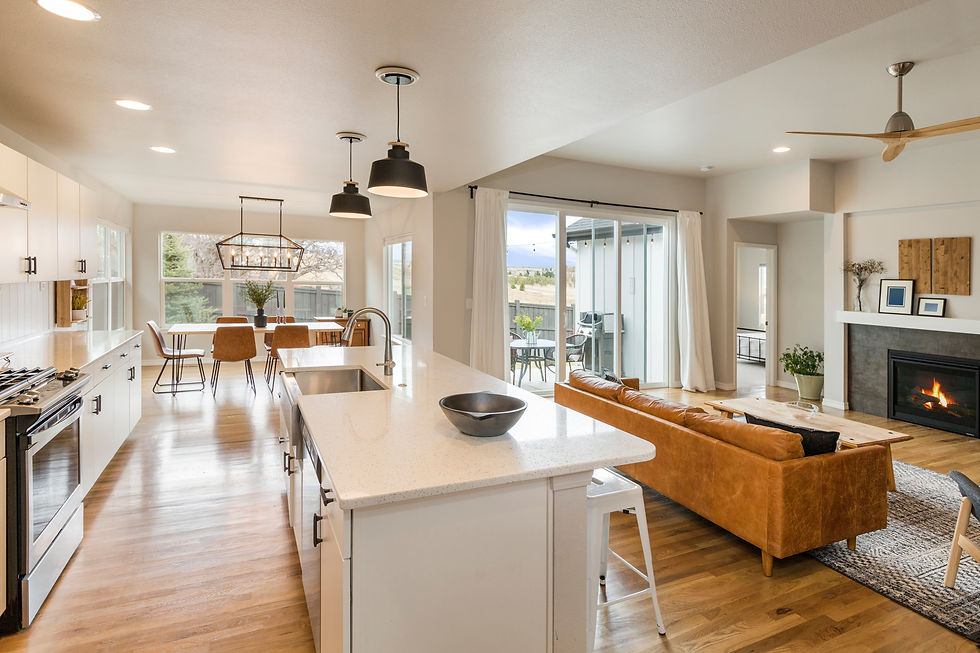Top 10 Things to Consider When Searching for your Waterloo Region Dream Home
- Team Pinto

- Jan 24, 2024
- 7 min read

Turning the "dream home" aspiration into reality is a thrilling yet daunting adventure, especially in the dynamic market of the Waterloo Region. Unlike any other purchase, this one shapes your life for years to come, becoming a nest for cherished memories and future aspirations. So, how do you know you've unearthed the perfect haven?
How can you determine if you've found your ideal place? Most people think you'll just know, but while a gut feeling might guide you to your final choice these top 10 tips will illuminate your home search and ensure you're exploring the right avenues:
1. List the home features you’ve always wanted:

Congratulations on taking the exciting step towards finding your dream home – you truly deserve it! Remember, when looking for this special place, it's important to view things with a fresh perspective. Perhaps in your past home searches, you focused on practical needs like a sufficient number of bedrooms for your family or a short commute to work.
However, searching for your dream home is a different journey. It's not just about fulfilling basic needs, but also about realizing your deepest desires. Feel free to dream big and create an extensive wish list. Everyone's ideal home is different. For instance, you might value having a nearby community gym, while your partner might prefer the seclusion of a detached house.
Take the time to sit down with your family and list out what each of you would love in a home. Then, prioritize these features in order of importance. It's rare to find a home that checks every single box, but this process will guide you in focusing on properties that meet most of your important criteria.
2. Check out neighbourhoods and surrounding areas:

Remember, your future home is more than just a building – it's a part of a larger community where you'll live your everyday life. So, it's crucial to choose a neighborhood that aligns with your lifestyle and preferences before committing to a house.
Ask yourself: Do you dream of walking to a nearby café each morning, or are you looking for a quiet area away from bustling streets and noisy neighbors? Whatever your preferences, make sure to thoroughly research and explore different neighbourhoods as part of your home search.
If possible, take a drive through these areas or better yet, spend some time there. Stroll through local parks, dine at neighborhood eateries, and get a feel for the community. Once you've identified areas that you're drawn to, inform your real estate agent. They can use this insight to focus on showing you homes in these neighborhoods or similar areas that tick all the right boxes for you.
3. Keep lot location and size in mind
When you're in the market for a new home, it's easy to overlook the importance of the lot it sits on, but it should actually be one of your top considerations. The lot is the one element of a property that you can't change. Think about it: you can tear down a house and rebuild it entirely, but the land it's on remains constant, no matter what changes you make to the structure.
Before making an offer on any home, take a good look at the lot's location and size. Ask yourself some key questions. Are you looking for a spacious backyard where your kids can play? Or perhaps, is there a particular view from the property that you can see yourself enjoying for years to come?
If you find that the lot doesn’t quite meet your needs or desires, don't hesitate to keep looking. Remember, it's often easier to find a house you like on a better lot than to settle for a less-than-perfect plot of land that you'll have to live with every day.
4. The age of a property

When it comes to purchasing a home, especially the home you've dreamed about your entire life, age does matter. Buying an older home or a brand new one both have advantages and disadvantages, so know what you're getting into before making an offer.
Do you drool over the incomparable allure of older houses? If that's the case, narrow your search to historical gems in the rough. Older homes, on the other hand, usually demand more TLC than their newer counterparts.
Is your perfect home, on the other hand, as simple as turning the key in the front door? Do you fantasize of having a closet large enough to house your substantial wardrobe and a spa-like master bath? Newer construction may be a better fit in this scenario.
5. Your ideal home style

You want to make sure your home is one that you'll be glad to pull up to each day, whether it's a way of life or the actual aesthetic of your property. Because the appearance of a home is one of the first things you (and others) notice about it, finding a style that suits your personality is crucial.
Single-family homes are ideal for those who desire the freedom to personalize a home to their exact specifications. Condo living is for those who want to own a home but also have access to hotel-style amenities. Town home living is a good mix between the two, but each community has its own set of rules, so make sure you know what they are.
6. The right amount of space

When searching for your ideal home, one of the key decisions you'll face is figuring out just how much space you really need. Opting for a home that's too small can mean constantly having to juggle and rearrange your living space to make it work. On the other hand, a larger property might give you all the room you need to spread out, but it often comes with a higher cost.
Reflect on your current living situation. How does your current space make you feel? Are the bedrooms sufficient, or are you finding yourself sharing space with other family members? Do you have ample room for all your possessions?
It's important to consider not only your present needs but also what the future might hold. If you're planning on growing your family soon, factor in the need for extra space. The goal is to strike a balance – a home that accommodates your growth without being excessively large and unwieldy.
7. A layout you love:

Not all square footage is created equal, which is where the floor plan comes into play. If you compare two properties that are 2,000 square feet, one could dedicate most of the space to the living area while the other could focus on more spacious bedrooms.
While it is possible to redesign your floor plan after moving into the home, it’s a long process that requires a huge commitment of time and finances. Unless you are particularly handy, it’s a project that will require hiring a team of contractors.
Be sure to focus on finding a layout that is as close to perfect for you as possible. Picture yourself using the space as you walk through the property. Think about things you’d like to do over the years you spend in your dream home.
For example, if you take pride in hosting the family holiday party every year, consider an open-concept plan that will you’re your guests plenty of room to roam. However, if each of your family members relishes in having their own private space, a more traditional layout might be a better option.
8. The potential for future projects:

Even your dream home is going to require a little bit of customization – as it should. Whether you’ve spent years wishing for a chef-style kitchen, poolside backyard oasis, or a tricked-out media room, it’s unlikely that those features will be exactly to your specifications from the moment you close on the home.
Keep an eye on how much personalization is required in each property you view. Even if it happens slowly over time, be honest with yourself about how much of that work you'll be able to handle. If you're comfortable with power tools, make sure you're willing to put in the time. If you choose to hire a professional, be prepared to set aside a significant sum of money. Consider both large and small renovations, such as painting the dining room or fully remodeling your master bathroom.
9. Costs that make you comfortable:

This isn't the most enjoyable aspect to consider, especially in comparison to upgrades and aesthetics. However, if cost isn't taken into account, your dream home may end up being more of a source of stress than a source of relaxation.
Try not to push yourself to the limit of your financial resources. Keep in mind that there are additional expenditures to consider in addition to the monthly mortgage payment. When buying a home, keep in mind local taxes, monthly utility expenditures, and association fees.
A word of caution: keep in mind that these prices will remain stable over time. If your circumstances change, such as retirement or an impending layoff, you'll still need to account for them. Allow some wiggle room in your budget, so you can enjoy your ideal house for many years to come.
10. Compromises you can handle:
It's just as vital to be aware of what you'd like to find in your dream home as it is to be conscious of whatever aspects of homeownership would make you unhappy. That way, you can steer your home search away from those elements, ensuring that your ideal living experience is not ruined by a flaw you can't change.
If you can't stand the idea of living right next to your neighbors, look for a smaller home with more yard space or widen your search area to a less-populated location. If you can't bear the thought of spending your weekends performing major landscaping tasks avoid buying a home with a large backyard, even if the rest of the house appeals to you. Every property comes with some form of compromise, but when it comes to your dream home, such compromises should be limited.
The bottom line

If you're on the quest for your dream home in the Waterloo Region, success is within your reach with careful research and the guidance of an experienced real estate agent. As you begin the exciting journey of home buying with your family, keep these crucial factors at the forefront. They will be your compass in identifying the must-have features of your ideal home.
Ready to take the leap and find your perfect home in the Waterloo Region? Don't wait! Team Pinto is here to empower you with our vast experience and expertise in the real estate market. Contact us today to tap into the skills of the award-winning Team Pinto. Better yet, book your free, no-obligation Zoom consultation now to discuss your unique real estate needs in the Waterloo Region. Let's make your dream home a reality together!


